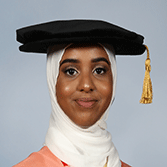Fahma Mohamed

Doctor of Laws
Friday 15 July 2016 at 1.30 pm - Orator: Noha Abu El Magd
Mr Vice Chancellor,
Every so often in history we are granted a glimpse into the lives of those who would go out to change the world as we know it. Those who stand out from the crowd, a single voice that starts small and proceeds to provoke a generation. They are the champions of a fairer, better society for their defiance of the status quo, for their resilience in the face of adversity, and for their commitment to the betterment of mankind.
If we are fortunate enough, we are able to participate in their journey, and recognise both their triumphs and their efforts. And today we are very fortunate. It is a privilege and an honour to be awarding today, one of the youngest recipients of an honorary degree and soon to be one of the youngest doctorate holders in the UK, Fahma Mohammed.
If you haven’t heard of Fahma, or seen her in the newspapers then perhaps your daughters and nieces, relatives and friends who are still at school can tell you about her. They might be able to tell you about the strides made in women’s liberation, the confrontation of violence against women, and a human rights campaign that started with four young girls writing poetry on their school computers and ended up at the United Nations. About the rectification of a national curriculum by a group of young girls from Bristol’s very own City Academy.
FGM or female genital mutilation, is a highly taboo subject. Not knowing what it was at the time, and too young to fully comprehend it, Fahma was horrified to learn of the practice, and to learn that it continues in the UK to this day. For there are few issues that can be compared to FGM practices. It is considered, an embodiment of the very essence of the degradation of women. A wrong that is a manifestation of the attempts to control women, an act that destroys lives and cripples communities.
Fahma began to get involved with the charity, Integrate Bristol, which was co-founded by her English teacher at the time, Lisa Zimmerman. Reserved at first, Fahma quickly found her voice through the will and determination to champion the voices of those who didn’t have one, to fight for the young girls that had suffered this abuse with no one listening and to protect against anyone from ever having to go through it again.
Fahma and the charity worked for years to raise awareness on the issue and challenge the taboo. Slowly it has grown into a project that empowers young women and communities, influences policy and even changes laws.
Two years ago, Fahma became the face of the national campaign to end FGM. She launched a petition to the Secretary of Education, demanding that every girl be protected from FGM. This culminated in compulsory training for public sector workers to help teachers, doctors and social workers identify and assist girls at risk.
And it hasn’t been without its challenges; from protests at the screening of their first documentary on FGM, to criticisms from within their own community, and resistance from the powers at be. Fahma says the campaign against FGM has been like fighting a ghost, an adversary most people don’t even know about let alone are brave enough to confront. It was the young mothers who came out to defend the cause, and their strength and resilience has been the force that drives the girls and the backbone of the campaign throughout.
But it’s not the praise nor the recognition, not even from the General Secretary of the UN, that drives Fahma to do what she does, but rather the opportunity to do something – however small –to change one person’s life for the better. She is an example of what young people have to offer, and an advocate for the message that Bristol sends out to the world. A message of tolerance, acceptance and the desire for positive change.
Fahma came to call Bristol home when she was seven years old, and says that no matter where life takes her now, a part of her will always belong in Bristol. In addition to receiving this honorary degree before university, Fahma is due to attend King’s College London to study Biomedical Sciences this September.
She strives for the opportunity to always speak out against the injustices she sees in the world and to never stop fighting for the issues she feels passionate about.
An inspirational, Black, Muslim woman, a proud Somali and a proud Bristolian who comes from a powerful line of strong women and a diverse community of fiercely supportive friends, Fahma has broken down barriers and paved the way for young girls to never concede their ownership of themselves, their bodies or their lives. And with everything she has achieved, and everything she will achieve, Fahma says she wouldn’t be here today if it weren’t for the way her mother raised her.
And so I will leave you with the words of Fahma’s mother – who is here with us today – and a philosophy that has shaped an incredible woman: to never let anyone tell you, you can’t do something because of who you are or where you come from.
Mr Pro Vice-Chancellor, I present to you Miss Fahma Mohammed, young champion of human rights, unsettler of the patriarchy, Bristolian, as eminently worthy of the degree of Doctor of Law honoris causa.